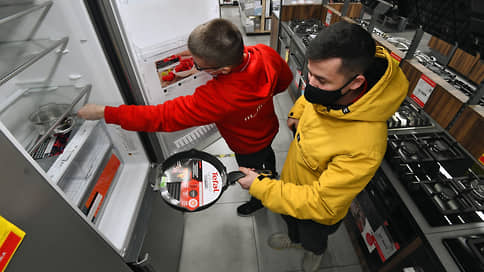“Kommersant” got acquainted with the reviews on the project of the Ministry of Finance on fines for violations of the rules for the circulation of traceable goods
[ad_1]

For the same violations related to the use of the traceability system of goods, it will be possible to receive fines that differ by a hundred times, the industry association notes in its response to the draft amendments to the legislation of the Ministry of Finance. The requirements include, in particular, the import and circulation of refrigerators, televisions and washing machines. Market participants note that many elements of the system have not yet been debugged, so fines need to be “postponed or significantly reduced.” The Ministry of Finance also notes that they have already met business halfway – initially it was proposed to make the fines negotiable.
“Kommersant” got acquainted with the reviews on the project developed by the Ministry of Finance to establish fines for violations of the rules for the circulation of traceable goods. The relevant amendments to the Code of Administrative Offenses (published for public discussion on July 17) provide, in particular, a fine for failure to submit a report on transactions with traceable goods (these include, in particular, monitors, televisions, washing machines and household refrigerators) in the amount of 1–30 thousand . rub. for individual entrepreneurs and 1–100 thousand rubles. for organizations.
The product traceability system has been in place since July 2021. Parties that fall under the regulation are assigned an identifier. During the circulation of goods in Russia, it is included in invoices and shipping documents. Market participants must notify the Federal Tax Service (system operator) of the import, movement and balance of such goods.
The Association of Trading Companies and Manufacturers of Electrical Household and Computer Equipment (RATEK; unites M. Video-Eldorado, Huawei, LG, Samsung, etc.) proposed fixing the fine for violation at the lower level – 1 thousand rubles, follows from its withdrawal. A significant spread of fines for the same violation will lead to the fact that market participants will not be able to predict the size of sanctions, “such thresholds, taking into account the number of documents that are issued daily, can cause serious damage,” RATEK explained.
For the same reason, RATEK also proposes to reduce fines for violation of sending invoices with traceability details: now the Ministry of Finance wants to set it in the range of 200 rubles. up to 30 thousand rubles for individual entrepreneurs and 100 thousand rubles. for legal entities. There are disagreements between the association and the ministry about the entry into force of the amendments. The Ministry of Finance proposes to introduce fines from January 2024, while RATEK considers it necessary to postpone them until January 2025.
The RSPP Committee on Integration, Trade and Customs Policy and the WTO also proposes to consider the issue of “eliminating or significantly reducing fines”. They explain that storekeepers, mechanics and other employees involved in the write-off of goods may not provide the necessary data to the accounting department – “this will entail the need to conduct a quarterly inventory and require the refinement of business processes.” Ozon also left a critical review of the project, where they emphasize that many errors in the transfer of information arise due to the fault of counterparties: “Until clarifications are given on the distribution of responsibility between them, it is worth refraining from administrative responsibility.”
However, the Ministry of Finance rejected all the comments received, according to the regulation.gov.ru portal. The ministry explained that initially they were going to make the fines negotiable, calculating them on the basis of the value of the marked goods. The sanctions proposed now, according to the Ministry of Finance, are commensurate with the offenses and were discussed with business, and the date for their entry into force has already been postponed from January 1 “in order to support.” The ministry did not respond to Kommersant’s request.
The new fines “do not contribute to the fight against uncontrolled gray imports, so it is necessary to develop a mechanism to regulate this segment of the economy,” MTS told Kommersant, specifying, however, that “we are ready to fulfill all the requirements of the law.” At F+tech | Marvel told Kommersant that they expect the government to “easing the requirements in terms of regulating the accompanying set of documents necessary for the product to get on the shelf.” They added that they generally support the introduction of a traceability system, as well as initiatives for labeling and certification of goods, “but legislative simplification and regulation of procedures for obtaining certificates and other permits is necessary.”
[ad_2]
Source link





